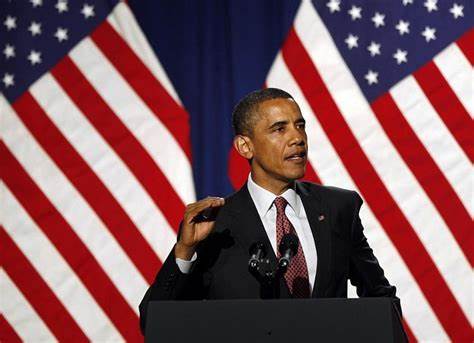Welcome to THE MAKING OF A NATION -- American history in VOA Special English. I'm Steve Ember. This week, our series brings us to the events of two thousand eight. It was a year that combined one of the nation's worst financial crises with one of its most exciting elections in recent history. In two thousand six and two thousand seven, the American housing market began to collapse. Home values had been going up and up. Now the balloon burst. People started losing homes they had bought with money borrowed on easy credit terms -- loans they were then unable to repay.
The hope was that the crisis in the housing market could be contained, and that it would not spread to the wider economy. Traditionally, local banks would have suffered the losses on the bad loans. But times had changed. Big investment banks had been buying those loans. The investment banks then resold them as securities offering high returns. Credit rating agencies working for the investment banks had told investors that the securities were safe. Selling a financial product based on a large group of loans was supposed to limit the risk if a few loans went bad. That was the idea. But that was before millions of homeowners stopped paying their mortgage loans. Mortgage bank securities became known as toxic assets, no one wanted to be anywhere near them.
In March of two thousand eight Bear Stearns became the first investment bank to fail as a result of the crisis. Others followed. In September, Lehman Brothers, the nation's fourth-largest investment bank, sought protection in bankruptcy court. Its failure only deepened the fears in credit markets. Toward the end of two thousand eight an international credit freeze developed. No one wanted to take the risk of lending money to banks or other companies that might have owned toxic assets. Some people feared that there could even be a global depression, the first since the nineteen thirties. The United States economy -- the world's largest -- started shrinking at the end of two thousand seven. The unemployment rate started rising.
President George W. Bush's administration, Congress and the central bank, the Federal Reserve, took extraordinary steps to deal with the growing financial crisis. Their efforts included loans to banks, automakers and other companies. The aim was to rescue businesses that officials considered "too big to fail." The bailouts from Washington were a decision that not all of the American people agreed with. But the people also had to make a decision of their own in two thousand eight.

It was a presidential election year, and the candidates were some of the most diverse in the nation's history. The Republican Party nominated Arizona Senator John McCain. At seventy-two he would have taken office as the nation's oldest first-term president. "So stand up with me, my friends, stand up and fight for America, for her strength, her ideals and her future. The contest begins tonight!" John McCain had been a Navy pilot during the Vietnam War. In nineteen sixty-seven, the North Vietnamese shot down his plane and took him prisoner. He was tortured and held for more than five years. He returned home a hero. During the presidential campaign, he spoke often about his experience as a prisoner of war. His campaign message was, "Country First."
Senator McCain quickly secured the Republican nomination to succeed George Bush. The Democrats needed more time to choose a nominee. The race settled on two leading candidates. One of them was Hillary Clinton. Her husband was former president Bill Clinton. They spent eight years living in the White House. As first lady she held an unusually public role in her husband's administration. Later she was twice elected as a senator from New York. Now she was trying to return to the White House -- this time as the first woman president of the United States. "So if you want a winner who knows how to take them on, I'm your girl!" The other leading candidate for the Democratic Party's nomination would also make history if elected. He was a first-term United States senator from Illinois named Barack Obama.
He was born in Hawaii to a white mother from Kansas and a black father from Kenya. If he won, he would be America's first black president. Blacks in the United States had been slaves until eighteen sixty-three. They were not permitted to vote until eighteen seventy. Women in the United States did not have a constitutional right to vote until nineteen twenty. And not until the nineteen sixties did federal civil rights laws bar discrimination against either group. During the nominating fight between Hillary Clinton and Barack Obama, there was a lot of discussion and debate in America about gender and race. Some talked about the problems that women still faced in society, and wondered whether Americans could accept a woman as president. Others talked about the problems that blacks still faced in society, and wondered whether Americans could accept a black man as president.













